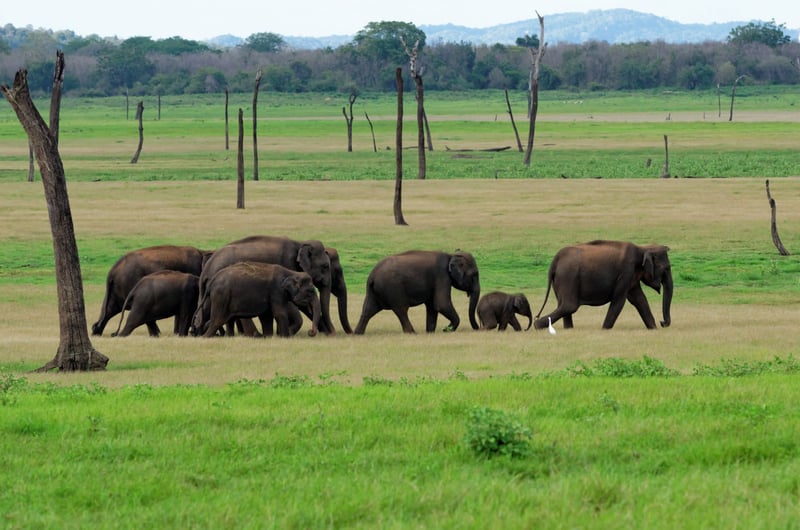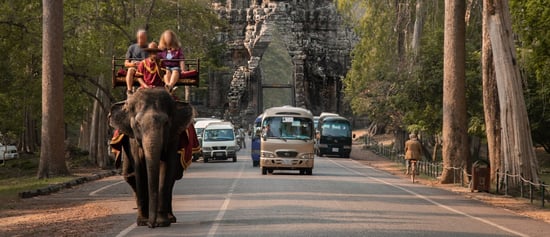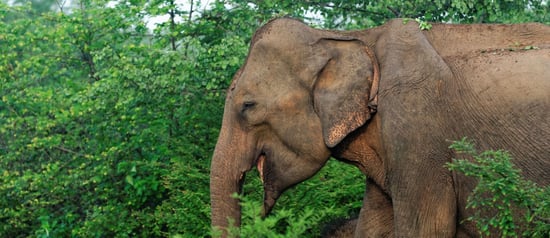
How to be an elephant-friendly tourist
News
Thousands of elephants around the world are suffering in the name of tourism. Here are some of ways you can be an elephant friendly tourist as the world opens up and you take off on your next adventure.
Don’t get taken for a ride
Despite what some venues tell you, there is no such thing as responsible elephant rides or shows. Captive elephants go through a cruel training process called ‘the crush’ – where they are physically restrained, beaten with sharp metal bullhooks, and deprived of food and water – to make them submit to human interactions. It’s a lifetime of elephant suffering for a once-in-a-lifetime holiday experience.
Once their spirits have been broken, they are chained up in isolation between giving rides or performances – all deeply distressing and damaging for these intelligent, social animals.
You can do your part by pledging to only see elephants in the wild, or at an elephant friendly venue. Elephant friendly venues don't use elephants for entertainment, or allow any direct human-elephant contact.
Washing elephants promotes suffering too
"Bathing and washing” experiences are aimed at tourists looking to do the right thing, trying to experience wildlife without cruelty. These venues, often posing as “sanctuaries,” offer the once-in-a-lifetime opportunity to bathe with an elephant or wash them.
Taking part in these experiences and sharing photos on social media sadly perpetuates the misconception that elephant washing is cruelty-free, driving the demand for venues offering it.
The sad truth is that these interactions are only possible through cruel early training to obey commands. Elephants are wild animals, even those born in captivity, and as such aren’t naturally disposed to interact with humans.
Close interaction with elephants yields great risk for the visitors – you’ll notice in photos that mahouts (elephant handlers) are always close-by to control the animals.
For the elephants, repeated washing (for example, from hourly tour groups) can damage skin and provides no additional hygiene benefits.
See elephants in the wild
Getting up close to captive elephants cannot compare to the truly special experience of seeing elephants in wild, free to exhibit their natural behaviour, in their natural environment.
There are many national parks across Asia and Africa where seeing wild elephants is possible. Wild elephants will spend their days roaming long distances, grazing and socialising with other elephants, not confined in small enclosures or forced to perform.
Visit an elephant friendly venue
Many tourists have visited what they thought was an elephant sanctuary. While a venue may call itself a sanctuary, rescue centre or retirement home for animals, this doesn’t mean it’s a high welfare or elephant-friendly.
Elephant friendly venues do not use elephants for entertainment or allow any tourist-elephant contact. They give elephants wild or semi-wild living conditions where they can socialise, move freely and forage. A true sanctuary rescues elephants from captivity and does not breed them. It should also work to educate visitors about elephant welfare and conservation.
The best way to see elephants is in the wild, where they belong. Where that’s not possible, the next best option is to visit a genuine wildlife sanctuary or elephant friendly venue.
How to help elephants
Spread the word about elephant friendly travel to your friends and family. The more people who know about the cruelty involved in most captive elephant venues the less demand there will be for attractions that exploit these beautiful wild animals.
While we wait for more international borders to open up, there are plenty of ways to help elephants. World Animal Protection is providing ongoing care, food and vital supplies to the elephants in their partner sanctuaries and elephant-friendly venues across Southeast Asia .
As the tourism industry struggles, it’s wild animals (who should never have been in captivity in the first place) who will suffer the most – left abandoned, neglected and starving.
- $19 could buy sugarcane for one elephant for a month
- $36 could buy bananas for one elephant for one month
- $170 could feed one elephant for a week
You can do your part by pledging to only see elephants in the wild, or at an elephant friendly venue.
Elephant rides
Today, more than 3,000 elephants are being used and abused to entertain tourists and visitors across Asia.
Our wildlife work
Around the world, wild animals are being exploited. They’re hunted down, trapped and farmed in captivity, all to be sold and abused for entertainment, medicine, fashion, pets and products.



